裕兴新概念英语第二册笔记 第06课
新概念英语第二册第六课
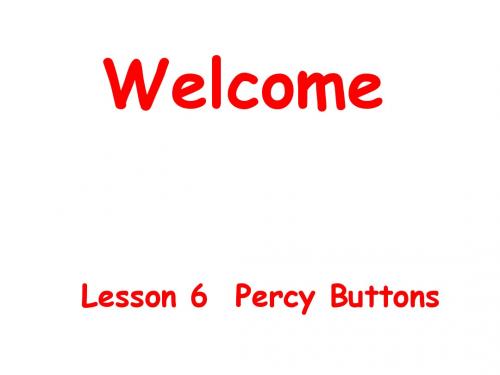
beg [beg] v.乞求,行乞 1. beg for sth from sb 向...行乞/乞求... beg sb (not) to do sth 乞求XX(不)做.. He begged for a meal from me. They begged her to help. 2. I beg your pardon! 1)Sorry.抱歉, 原谅 2)Please repeat that! eg: ---Where‘s the post office? ---_________? A. You are welcome. B.All right. C. I beg your pardon. D.No way!
5. What’s his name?
6. How often does he call on the houses in Bridge Street?
Lesson 6 Percy Buttons I have just moved to a house in Bridge Street. Yesterday a beggar knocked at my door. He asked me for a meal and a glass of beer. In return for this, the beggar stood on his head and sang songs. I gave him a meal. He ate the food and drank the beer. Then he put a piece of cheese in his pocket and went away. Later a neighbour told me about him. Everybody knows him. His name is Percy Buttons. He calls at every house in the street once a month and always asks for a meal and a glass of beer.
新概念英语第二册Lesson6

回某人电话
call on sb
拜访某人
call at +地点
拜访某地
call in sb
招集和邀请某人
He calls at every house in the street once a month.
New words:
beggar n. 乞丐 food pocket n. 衣服口袋 call v. 拜访,光顾
In return for this, the beggar stood on his head and sang songs. I give him a meal. He ate the food and drank the beer .
Then he put a piece of cheese in his pocket and went away.
Some of them possess the diploma and certificates of the qualifications, and even some of them have the university degree.
Most of them have a lot of working experiences.
some tea a little money much information a lot of rain a great amount of food
新概念英语第二册第6课学习笔记

Lesson 6 Percy Buttons 珀西.巴顿【New words and expressions】生词和短语(4)beggar n.乞丐气 food n.食物pocket n.衣服口袋 call v.拜访,光顾☆beggar n.乞丐 beg v.乞求行乞重读闭音节, 需双写g。
类似的词有begin,run,swim,big,rob. beg(for)sth from sb 乞求…, 向…行乞ask sb for sth:请求得到某物beg sb for sth 恳求, 乞求(以谦虚的姿态要求)beg sb (not) to do sth 恳求某人(不要)做某事beg somebody off 为某人求情I beg your pardon?(1)I’m sorry./Excuse me.对不起, 请原谅!(2)Please repeat it./Pardon.请再说一遍。
☆food n.(1)(U)食物通常是不可数名词a lot of food(C)作为特种食品时, 可看做可数名词Baby foods 婴儿食品 health foods 健康食品Frozen foods 冷冻食品 breakfast foods 早餐a favorite foods 最喜欢的一种食物(3)food chain 食物链★pocket n.衣服口袋 ,衣袋inner pocket 内口袋; jacket pocket 夹克的口袋;coat pocket 大衣口袋 pocket book 袖珍书;pocket dictionary 袖珍词典 pocket money (小孩的)零花钱change零钱 get exact [ɪg'zækt]确切的,精确的change 准备好正确的零花钱beer money (男人的)零花钱(18世纪, 在小说里有时能见到女人的零花钱是针线钱。
但是随着时代的进步, 剩下的money都归女人管, 所以女人无零花钱。
新概念英语第二册:第6课课文详解及语法解析
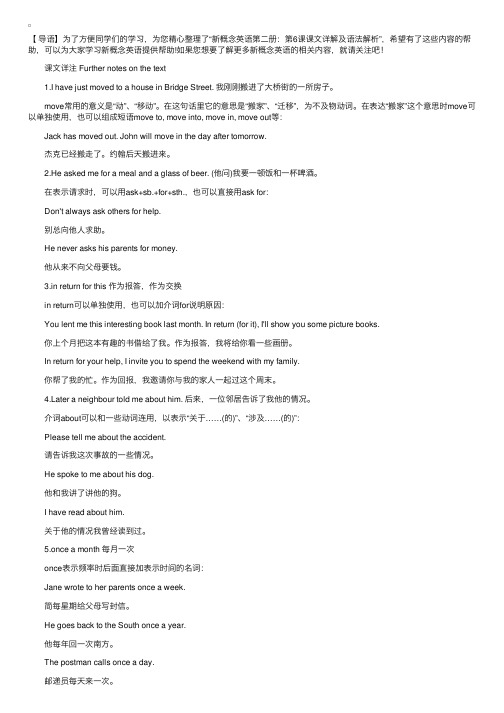
【导语】为了⽅便同学们的学习,为您精⼼整理了“新概念英语第⼆册:第6课课⽂详解及语法解析”,希望有了这些内容的帮助,可以为⼤家学习新概念英语提供帮助!如果您想要了解更多新概念英语的相关内容,就请关注吧! 课⽂详注 Further notes on the text 1.I have just moved to a house in Bridge Street. 我刚刚搬进了⼤桥街的⼀所房⼦。
move常⽤的意义是“动”、“移动”。
在这句话⾥它的意思是“搬家”、“迁移”,为不及物动词。
在表达“搬家”这个意思时move可以单独使⽤,也可以组成短语move to, move into, move in, move out等: Jack has moved out. John will move in the day after tomorrow. 杰克已经搬⾛了。
约翰后天搬进来。
2.He asked me for a meal and a glass of beer. (他问)我要⼀顿饭和⼀杯啤酒。
在表⽰请求时,可以⽤ask+sb.+for+sth.,也可以直接⽤ask for: Don't always ask others for help. 别总向他⼈求助。
He never asks his parents for money. 他从来不向⽗母要钱。
3.in return for this 作为报答,作为交换 in return可以单独使⽤,也可以加介词for说明原因: You lent me this interesting book last month. In return (for it), I'll show you some picture books. 你上个⽉把这本有趣的书借给了我。
作为报答,我将给你看⼀些画册。
In return for your help, I invite you to spend the weekend with my family. 你帮了我的忙。
新概念英语2第六课 NCE2_Lesson06

vi. 下班,停止,中断(工作等) eg. When do you usually knock off? 你一般什么时候下班?
He knocked off for lunch at half past eleven. 他十一点半休息吃中午饭。
你看,我早就说 过的(你就是不听我的话)!
Everybody knows him.
everybody作为主语一定作单数看待
所有的不定代词作为主语一律为单数看待 : somebody, anybody,everything等
Everything has its beginning.
凡事都有个开始
His name is Percy Buttons. He calls at every house in the street once a month and always asks for a meal and a glass
ask (sb.) for sth 问某人要什么东西 这个男孩又向他父母要钱了。
The boy asked his parents for money again.
In return for this, the beggar stood on his head and sang songs. Return
Page 10
(3) vt.&vi. 叫,喊 eg.我听到有人在喊。I heard someone calling. call out =shout 大声喊 eg.简隔街看见男朋友时,就大声喊他 Jane called out her boyfriend's name when she saw him across the street. (4) vt. 呼唤,召唤 eg.露西病了,叫医生来。Lucy is sick. Please call a doctor.
新概念英语第二册第六课讲解

lesson 6 Percy Buttons一、生词和短语(词汇学习)词汇学习★knockknock at 敲(门窗等) ;knock at the door 敲门knock off: 下班,He knocked off earlier.knock sth off+ 地点:把某物从某处碰翻;knock the vase off the tableknock off: 打折,knock 10% off the price. 把价格降低10%。
knock over:打翻,碰翻 A car knocked the boy over. He knocked a glass over. 他把玻璃杯打翻了。
如果有地点,off; 无地点,over,I knocked the boy off the bicycle.knock out:淘汰;击败;出局;使不省人事;The thief stuned the police in the fight. 在搏斗中,小偷把警察打昏了。
★beggar n. 乞丐beg v. 乞求;I beg your pardon?ask for : 请求得到;beg for : 乞求得到★food n. 食物不可数; a lot of food★pocket n. 衣服口袋★call v. 拜访,光顾call sb: 给某人打电话;call up sb: 给某人打电话call back: 回某人电话;Can you tell him to call back?call on sb 拜访某人;I will call on you.call at+ 地点=visit someplace 拜访某地;I will call at your Home.call out =shout, 大声喊call in sb: 招集和邀请某人;For the project,the government called in a lot of experts.二、听力(回答问题)三、课文讲解(语法)四、课后习题【课文讲解】1 、I have just moved to a house in Bridge Street. 我刚刚搬进了大桥街的一所房子。
裕兴新概念英语第二册笔记_第6课_课文讲解

TextI have just moved to a house in Bridge Street. Yesterday a beggar knocked at my door. He asked me for ameal and a glass of beer. In return for this, the beggar stood on his head and sang songs. I gave him a meal. He ate the food and drank the beer. Then he put a piece of cheese in his pocket and went away.Later a neighbour told me about him. Everybody knows him. His name is Percy Buttons. He calls at every house in the street once a month and always asks for a meal and a glass of beer.I have just moved to a house in Bridge Street.just adv刚刚在国家/街道/城市前统统不加冠词,所以是in Bridge Street.move1v移动,改变位置eg move a chair nearer to the fire 把椅子移近这堆火2v搬家,迁居eg He couldn't pay his rent, so he had to move out. 他付不起房租,所以他不得不搬出。
3v使心动而(流泪/微笑等)eg Her story moved us to tears.eg We were greatly moved by his performance of the piano concerto. 我们为他的钢琴协奏曲的演奏而感动不已。
整理新概念英语第二册课文和笔记_Lesson_6

文件编号: 88-94-94-DD -28整理人 尼克新概念英语第二册课文及翻译新概念英语第二册课文及翻译Lesson 1 A private conversation 私人谈话Last week I went to the theatre. I had a very good seat. The play was very interesting. I did not enjoy it. A young man and a young woman were sitting behind me. They were talking loudly. I got very angry. I could not hear the actors. I turned round. I looked at the man and the woman angrily. They did not pay any attention. In the end, I could not bear it. I turned round again. 'I can't hear a word!' I said angrily. ‘It’s none of your business,' the young man said rudely. 'This is a private conversation!'.上星期我去看戏。
我的座位很好,戏很有意思,但我却无法欣赏。
一青年男子与一青年女子坐在我的身后,大声地说着话。
我非常生气,因为我听不见演员在说什么。
我回过头去怒视着那一男一女,他们却毫不理会。
最后,我忍不住了,又一次回过头去,生气地说:“我一个字也听不见了!” “不关你的事,”那男的毫不客气地说,“这是私人间的谈话!”Lesson 2 Breakfast or lunch? 早餐还是午餐?It was Sunday. I never get up early on Sundays. I sometimes stay in bed until lunch time.Last Sunday I got up very late. I looked out of the window. It was dark outside.'What a day!' I thought. 'It's raining again.' Just then, the telephone rang. It was my aunt Lucy.' I've just arrived by train,' she said. 'I'm coming to see you.' 'But I'm still having breakfast,' I said.'What are you doing?' she asked. ‘I’m having breakfast,' I repeated.'Dear me,' she said. 'Do you always get up so late? It's one o'clock!''那是个星期天,而在星期天我是从来不早起的,有时我要一直躺到吃午饭的时候。
新概念英语第二册课堂笔记:第6课
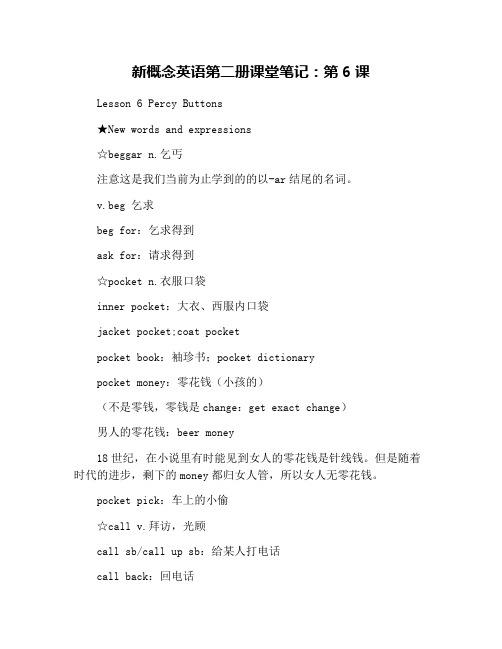
新概念英语第二册课堂笔记:第6课Lesson 6 Percy Buttons★New words and expressions☆beggar n.乞丐注意这是我们当前为止学到的的以-ar结尾的名词。
v.beg 乞求beg for:乞求得到ask for:请求得到☆pocket n.衣服口袋inner pocket:大衣、西服内口袋jacket pocket;coat pocketpocket book:袖珍书;pocket dictionarypocket money:零花钱(小孩的)(不是零钱,零钱是change:get exact change)男人的零花钱:beer money18世纪,在小说里有时能见到女人的零花钱是针线钱。
但是随着时代的进步,剩下的money都归女人管,所以女人无零花钱。
pocket pick:车上的小偷☆call v.拜访,光顾call sb/call up sb:给某人打电话call back:回电话我们昨天学的电话用语-Can you take a message for me?如果不想让第三人知道,你能够说:Can you tell him to call back?关于call的几个短语:call at+地点=visit someplacecall on sbI will call on you.=I will call at your home.call out=shout 大声喊call in sb 招集和邀请For the project,the government called in a lot of experts.★TextI have just moved to a house in Bridge Street.Yesterday a beggar knocked at my door.He asked me for a meal and a glass of beer.In return for this,the beggar stood on his head and sang songs.I gave him a meal.He ate the food and drank the beer.Then he put a piece of cheese in his pocket and went ter a neighbor told me about him.Everybody knowshim.His name is Percy Buttons.He calls at every house in the street once a month and always asks for a meal and a glass of beer.☆ask sb for sth:问某人要什么东西for:为了这个目的去请求某人。
第二册6课新概念笔记

Lesson 6 Percy buttonsNew words and expressionsbeggar [ˈbeɡə] n. 乞丐 food [fu:d] n. 食物pocket [ˈpɔkit] n. 衣服口袋 call [kɔ:l] v. 拜访,光顾beggar n.乞丐1)beg v. 乞求,行乞重读闭音节,需双写g。
类似的词有begin,dig,run,swim,drag[dræg拖拉,big,rob [rɒb]抢劫a begging letter 求援信2)beg sth from sb 乞求。
,向。
行乞beg for sth from sb.Percy Buttons begged for a meal and a glass of beer from me.这个叫Percy Buttons向我讨要一杯啤酒和一顿饭。
Percy Buttons asked me for a meal and a glass of beer.ask sb for sthbeg sth from sb 向某人要,要求某物My little brother asks me for lucky money every year.我的弟弟每年都向我要押岁钱。
The girl asked her mother for that beautiful skirt.那个小女孩向妈妈要了一条漂亮的裙子3)beg sb for sth 恳求,祈求(以谦虚的姿态要求)Set him free, I beg you! 我求求你,饶了他吧!4)beg sb not to do sth 乞求某人不做某事beg sb to do sth 乞求某人做某事punish ['pʌnɪʃ]惩罚They begged us not to punish them 他们乞求我们不要惩罚他们He knew that he had hurt her and begged her to forgive him. 他知道他伤害了她,现在乞求她原谅他。
新概念二 Lesson 6 Percy Buttons最全知识点总结

Lesson 6 Percy Buttons★Warm up1、(冠词)1.1 冠词分类1.2 冠词作用1.3 不定冠词的用法展示1.4、定冠词“节目预告”1.5、冠词的“隐形表演”1.6、定冠不定冠,意思差千万1.7、冠词的位置2、some与any的用法★Listening1、Who knocked at the author’s door yesterday?2、What did the beggar do in return for his meal and beer?3、How often does Percy Buttons call at every house in the street?★Vocabulary● beggar [ˈbeɡər] n. (可数) 乞丐【记忆】beggar = beg乞讨+ar人,物,器→beggar乞丐,穷人【拓展】beg v. 恳求; 乞讨; (狗)用后腿站立; 请求原谅;beggary n. 赤贫、乞食的习惯、卑鄙、卑劣【搭配】dull beggar 言语无味的人、头脑迟钝的家伙insolent beggar 傲慢无理的家伙little beggar 小家伙(指小孩, 小动物)lucky beggar 幸运儿, 走运的家伙beg for 乞求得到beg one’s pardon 请原谅、请某人再说一遍go begging 行乞、销路极差beg off 恳求免除(责任、责罚等)【例句】The old beggar was dirty and unkempt. 那个老乞丐蓬头垢面.● food [fu:d] n. (不可数) 食物【记忆】food 谐音“福德”→过去有食物吃就是福德【拓展】fruit 水果dessert 甜品beverage 饮料cooking method condiment 调味品drink 饮料vegetable 蔬菜【搭配】science food 科学食品junk food 垃圾食品fast food 快餐staple food 主食【例句】The shallow sea bed yields up an abundance of food. 浅海床提供了丰富的食物。
新概念英语第二册第6课完整

in return for this 作为对……的回报
He doesn't want anything in return.
4.In return for this, the beggar stood on his head and sang songs.
1. I have just moved to a house in Bridge Street. move vt. 移动,感动 vi. 移动,迁移 e.g. I have just moved in. 我刚刚搬进来。 在表达“搬家”这个意思时move可以单独使用,也可以组成短语move to, move into, move in, move out Jack has moved out. John will move in the day after tomorrow. 杰克已经搬走了。约翰后天搬进来。
Yes, she has.
A beggar.
He stood on his head and sang songs.
She gave him a meal.
New Lesson
6 He didn’t pay you for the meal, did he? No, he didn’t. 7 What did he do in return for it? He stood in his head and sang songs. 8 He ate the food and drank the beer. What did he do then? Then he put a piece of cheese in his pocket. 9 Who told you about him later? A neighbour did.
逐句精讲新概念英语第二册第六课 珀西·巴顿斯
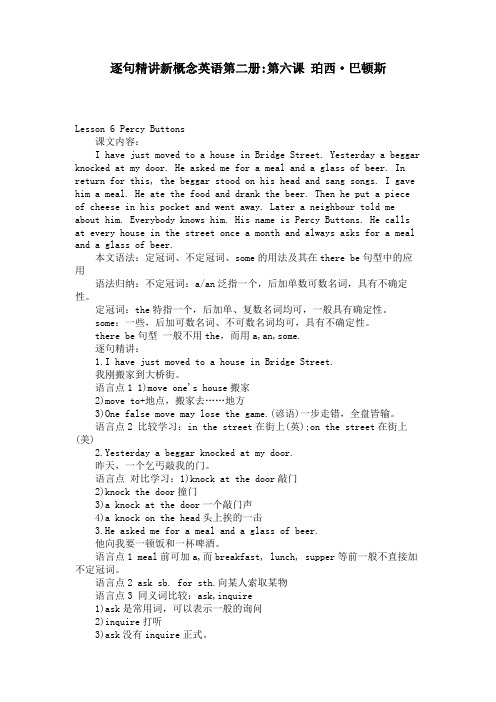
逐句精讲新概念英语第二册:第六课珀西·巴顿斯Lesson 6 Percy Buttons课文内容:I have just moved to a house in Bridge Street. Yesterday a beggar knocked at my door. He asked me for a meal and a glass of beer. In return for this, the beggar stood on his head and sang songs. I gave him a meal. He ate the food and drank the beer. Then he put a piece of cheese in his pocket and went away. Later a neighbour told me about him. Everybody knows him. His name is Percy Buttons. He calls at every house in the street once a month and always asks for a meal and a glass of beer.本文语法:定冠词、不定冠词、some的用法及其在there be句型中的应用语法归纳:不定冠词:a/an泛指一个,后加单数可数名词,具有不确定性。
定冠词:the特指一个,后加单、复数名词均可,一般具有确定性。
some:一些,后加可数名词、不可数名词均可,具有不确定性。
there be句型一般不用the,而用a,an,some.逐句精讲:1.I have just moved to a house in Bridge Street.我刚搬家到大桥街。
语言点1 1)move one's house搬家2)move to+地点,搬家去……地方3)One false move may lose the game.(谚语)一步走错,全盘皆输。
新概念第二册第六课讲解.doc

Lesson 6 Percy Buttons【New words and expressions】★beggar n. 乞丐beg v.乞求I beg your pardon?beg for 乞求得到ask for 请求得到(ask sb. for sth. 向某人索要某物)★food n. 食物(不可数)a lot of food★pocket n. 衣服口袋inner pocket 内口袋;jacket pocket 夹克的口袋;coat pocket 大衣口袋pocket book 袖珍书;pocket dictionary 袖珍词典pocket pick 车上的小偷pocket money (小孩的)零花钱change 零钱get exact change 准备好正确的零花钱beer money (男人的)零花钱★call v. 拜访, 光顾① vt.&vi. 叫,喊I heard someone calling.call out =shout 大声喊② vt. 呼唤,召唤Lucy is sick. Please call a doctor.③ vi. 访问,拜访;(车、船等)停靠Amy called (at our house) yesterday.The train calls at large stations only. 这列火车只停大站。
call on sb. 拜访某人I will call on you. 我要去你家。
call at+地点=visit someplace 拜访某地I will call at your home. 我要去你家。
④ vt.&vi. 打电话call sb =call up sb. 给某人打电话call back 回某人电话Can you take a message for me? =Can you tell him to call back?call in sb. 招集和邀请某人For the project, the government called in a lot of experts.【课文讲解】1、Yesterday a beggar knocked at my door.★knock v. 敲门① vi. 敲门I knocked, but no one answered.knock at 敲(门、窗等)knock at the door;knock at the window② vt.&vi. 碰撞You always knock things off the table. 你总是碰掉桌上的东西。
新概念英语第二册第6课完整

1. I have just moved to a house in Bridge Street.
move vt. 移动,感动 vi. 移动,迁移
e.g. I have just moved in. 我刚刚搬进来。
New words
没有食物和 水我们活不 了。
We can't live without food and water
heavy food 油腻而难消化的 食物 mental food 精神食粮
n. 食物(不可数)
food
New words
n. 衣服口袋
inner pocket jacket pocket coat pocket pocket book pocket dictionary pocket pick pocket money
3.He asked me for a meal and a glass of beer.
ask (sb.) for sth =request for sth. 问某人要什么东西 (for为了这个目的去请求某人, sb.更多的时候不出现, ask for sth.) The boy asked (his parents)for money again/once m
4.In return for this, the beggar stood on his hea and sang songs.
in return for this 作为对……的回报
He doesn't want anything in return.
4.In return for this, the beggar stood on his hea and sang songs.
裕兴新概念英语第二册笔记_第6课_课文讲解

TextJeremy Hampden has a large circle of friends and is very popular at parties.a large circle of friends 交际广泛be popular with受…的欢迎eg The nurse is very popular with little children. 那个保育员非常受小孩子们的欢迎。
be popular among sb 在某人中间受欢迎eg Chinese food is coming popular among Americans. 中餐越来越受美国人的欢迎了。
popular newspaper 大众报纸popular opinion 舆论popular government 民主政治party 1n 聚会,团,一行,一伙at parties 在各种聚会中have a party / give a party 聚会a party of tourists 旅行团tourist n the climbing party 登山者一行eg The president and his party started for Geneva. 总统一行今日启程前往日内瓦。
2n the party concerned 当事者admire sb for sth钦佩某人某事(因为…而钦佩某人)a sense of humor 幽默感sense 1a musical sense 音乐感eg He has no sense of business. 他没有经商意识。
2意念,意识a sense of hunger 饥饿感a sense of shame 羞耻感a sense of responsibility 责任感a moral sense 道德观3common sense 常识a man of good sense 同情达理的人4eg She lost her senses when she heard the news. 听到这个消息她失去了理智。
裕兴新概念英语第二册笔记 第06课精排
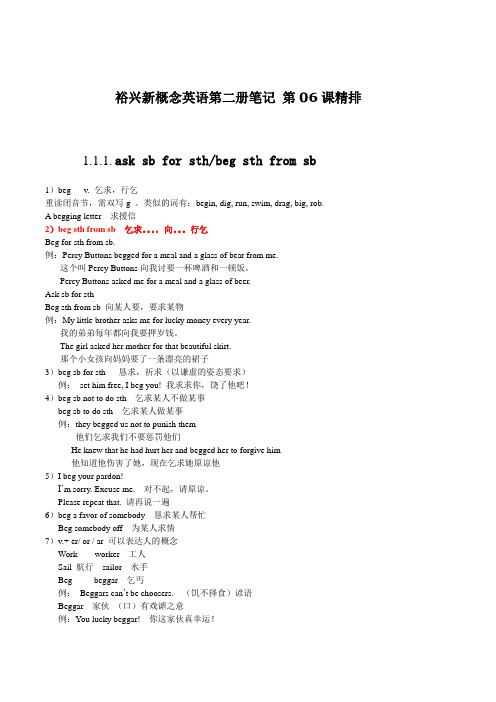
裕兴新概念英语第二册笔记第06课精排1.1.1.ask sb for sth/beg sth from sb1)beg v. 乞求,行乞重读闭音节,需双写g 。
类似的词有:begin, dig, run, swim, drag, big, rob.A begging letter 求援信2)beg sth from sb 乞求。
,向。
行乞Beg for sth from sb.例:Percy Buttons begged for a meal and a glass of bear from me.这个叫Percy Buttons向我讨要一杯啤酒和一顿饭。
Percy Buttons asked me for a meal and a glass of beer.Ask sb for sthBeg sth from sb 向某人要,要求某物例:My little brother asks me for lucky money every year.我的弟弟每年都向我要押岁钱。
The girl asked her mother for that beautiful skirt.那个小女孩向妈妈要了一条漂亮的裙子3)beg sb for sth 恳求,祈求(以谦虚的姿态要求)例:set him free, I beg you! 我求求你,饶了他吧!4)beg sb not to do sth 乞求某人不做某事beg sb to do sth 乞求某人做某事例:they begged us not to punish them他们乞求我们不要惩罚他们He knew that he had hurt her and begged her to forgive him他知道他伤害了她,现在乞求她原谅他5)I beg your pardon!I’m sorry. Excuse me. 对不起,请原谅。
Please repeat that. 请再说一遍6)beg a favor of somebody 恳求某人帮忙Beg somebody off 为某人求情7)v.+ er/ or / ar 可以表达人的概念Work worker 工人Sail 航行sailor 水手Beg beggar 乞丐例:Beggars can’t be choosers. (饥不择食)谚语Beggar 家伙(口)有戏谑之意例:You lucky beggar! 你这家伙真幸运!1.1.2.Food1)[u]食物,通常为不可数名词例:We can’t live for long without food and water. 没有食物和水我们活不长。
- 1、下载文档前请自行甄别文档内容的完整性,平台不提供额外的编辑、内容补充、找答案等附加服务。
- 2、"仅部分预览"的文档,不可在线预览部分如存在完整性等问题,可反馈申请退款(可完整预览的文档不适用该条件!)。
- 3、如文档侵犯您的权益,请联系客服反馈,我们会尽快为您处理(人工客服工作时间:9:00-18:30)。
单词学习beggar n. 乞丐beg [beɡ] v. 乞求,行乞重读闭音节,需双写g。
类似的词有:begin, dig, run, swim, drag, big, roba begging letter 求援信beg sth from sb 乞求…..向……行乞= beg for sth from sbeg. Percy Buttons begged for a meal and a glass of bear from me.帕西·巴顿斯向我讨要一顿饭和一杯啤酒相当于:Percy Buttons asked me for a meal and a glass of bear.ask sb for sth 向某人要求某物beg sth from sb (更谦卑)向某人要求某物eg. My little brother asks me for lucky money every year.我的弟弟每年都向我要压岁钱。
eg. The girl asked her mother for that beautiful skirt. 那个小女孩向她妈妈要那条漂亮的裙子。
beg sb for sth 恳求,祈求(以谦虚的姿态要求)eg. Set him free, I beg you! 我求求你,饶了他吧!beg sb not todo sth 祈求某人不做某事beg sb to do sth 祈求某人去做某事eg. They begged us not to punish them. 他们祈求我们不要惩罚他们。
eg. He knew that he had burt her and begged her to forgive him.他知道他伤害了她,恳求她原谅。
I beg your pardon!1) I'm sorry. / Excuse me. 对不起,请原谅。
2) Please repeat that./ Pardon 请再说一遍beg somebody off 为某人求情beg a favor of somebody 恳求别人帮忙v + er/or/ar 可以表达"人"的概念work-worker 工人; sail-sailor 水手; beg-beggar 乞丐eg. Beggars can't be choosers. 饥不择食(谚语)beggar 家伙,(口语)有戏虐之意eg. You lucky beggar. 你这家伙真幸运!food n.1) [u] 食物,通常为不可数名词eg. We can't live for long without food and water. 没有食物和水我们活不长。
mental food 精神食粮food for thought 应思考之事2) [u] 作为特种食品时,可作为可数名词baby foods 婴儿食品health foods 健康食品frozen foods 冷冻食品breakfast foods 早餐食物a favorite food 最喜欢的一种食物3) food chain 食物链pocket n. 口袋,兜儿,衣袋trouser pocket 裤子口袋pocket dictionary 袖珍字典pocket-knife 袖珍小刀pocket money 零花钱,一般指孩子的零花钱beer money 男士零花钱allowance (Am) 零花钱put one's hand in one's pocket 愿意花钱pick somebody's pocket 扒窃pickpocket n. 扒手。
尤指在人多处行窃的。
put somebody's pride in one's pocket 姑且忍辱负重call v./n.1) v. 拜访call on sb 拜访某人call at some place 拜访某地visit sb 拜访某人visit sp 参观某地drop in on sb 拜访某人drop in at sp 参观某地区别:visit 是最为正式的参观或拜访,指那种经过准备的,比较长时间的,比较正式的参观或拜访;call on sb, call at some place 在口语中更为常见,表示那种比较短时间的非正式访问等含义;drop in on sb, drop in at sp 更为不正式,表示顺道拜访。
2) v. 打电话call sb up=ring sb up 给某人打电话eg. I'll call you up this evening 今天晚上我会给你打电话的。
call for 要求,需要eg. This occasion calls for prompt action. 这种场合需要紧急行动。
3) n.a call for helpa cry for help 求助,求救call girl 应召女郎pay a call on a friend 拜访朋友,相当于:call on a friendroll call=call the roll 点名roll 卷状物;正式的表格,登记表;(尤指)名单,报名册move v./n.1) 移动,改变位置move a chair nearer to the fire 把椅子移近这堆火2) 搬家,迁居move from…to… 从……搬到……move to a new house 搬进新房子eg. He couldn't pay his rent, so he had to move out. 他付不起房租,所以他不得不搬出。
3) 使人动心而(流泪,微笑等)eg. Her story moved us to tears. 她的故事令我们感动得流泪。
eg. We were greatly moved by his performance of the piano concerto.我们为他的钢琴协奏曲的演奏而感动不已。
4) 提议eg. I moved for the suspension of further discussion. 我提议延缓进一步讨论问题。
(suspension n. 暂停,延缓)5) (事情)进行,进展eg. It is necessary to move on the problem soon. 立刻着手解决这个问题是很有必要的。
move about ,move around 四处走动move away 搬家move up 晋升move out 迁出,搬出去move over 挪开些6) n. 下棋的一步棋eg. It's your move. 轮到你下棋了。
7) n. 手段,措施make a move 采取行动on the move 在进展中,在移动中get a move on 催促前进课文讲解return1) n. 回报,作为报答in return for 回报eg. I bought him a present in return for his help. 我为他买了一份礼物,作为他帮忙的回报。
a return visit 回访a poor return for one's kindness 以薄礼回报他人的好意a return ticket 往返票2) v. 返回return home from abroad 回国return to ……from…… 从……归来,返回return sth to sb 归还,送回eg. You must return the book in a week. 你必须一周之内归还这本书。
eg. The enemy returned our fire. 敌人还击。
3) v. (疾病等)发作,重犯eg. My toothache returned in a few hours. 几小时后,我的牙疼又犯了。
stand on one's head = head over heels 头顶地倒立stand ( stood, stood ) v. 站立,直立eg. Stand still while I take your photograph. 当我为你拍照时,你站着别动。
v. 起立eg. Stand up! 起立!v. 容忍(尤用于否定句和疑问句中,与can/could连用,不能用于进行时态)eg. She's not going to stand for her own children disobey her.她不能容忍自己的孩子不服从她。
eg. He can't stand hot weather. 他忍受不了炎热的天气。
give sb sth = give sth to sbI give him a meal = I give a meal to hima piece of cheese 一块奶酪不可数名词要表示"一个"这类概念时,加a piece of 这类定语a piece of news 一条新闻a fit of anger 一股怒气a slip of paper 一条纸a length of cloth 一块布a block of ice 一大块冰a grain of rice 一粒米a lump of suger 一块方糖tellv. 告诉tell sb sthtell you a secret 告诉你一个秘密v. 辨认tell the difference between A and B 辨认A与B之间的区别tell a lie 说谎tell sb about sth 告诉某人关于……的情况eg. One of my neighbors told me about him. 我的一位邻居告诉我关于他的情况。
to tell the truth 老实讲tell the tale 话说得可怜以博取同情eg. You're telling me. 不用你说,我早就知道了。
(口语)eg. You never can tell. 谁也不敢说。
in the street (Br) 在大街上on the street (Am) 在大街上once a month 一个月一次once a year 一年一次once a week 一星期一次Special difficulties有些动词的后面加上介词或副词以后就会改变含义,这种新的组合被称作动词短语。
1. I put your book on the shelf. 我把你的书放在书架上。
